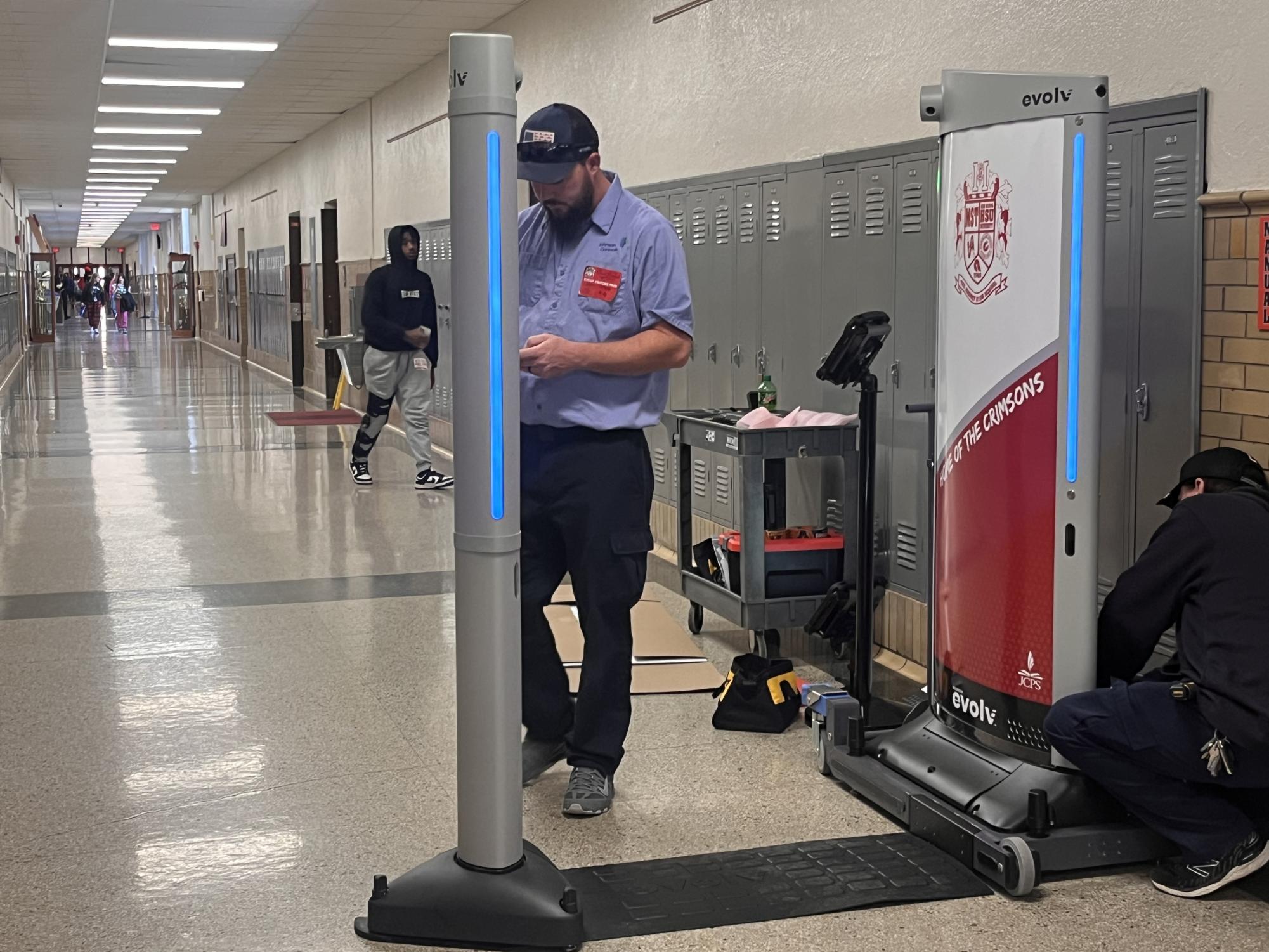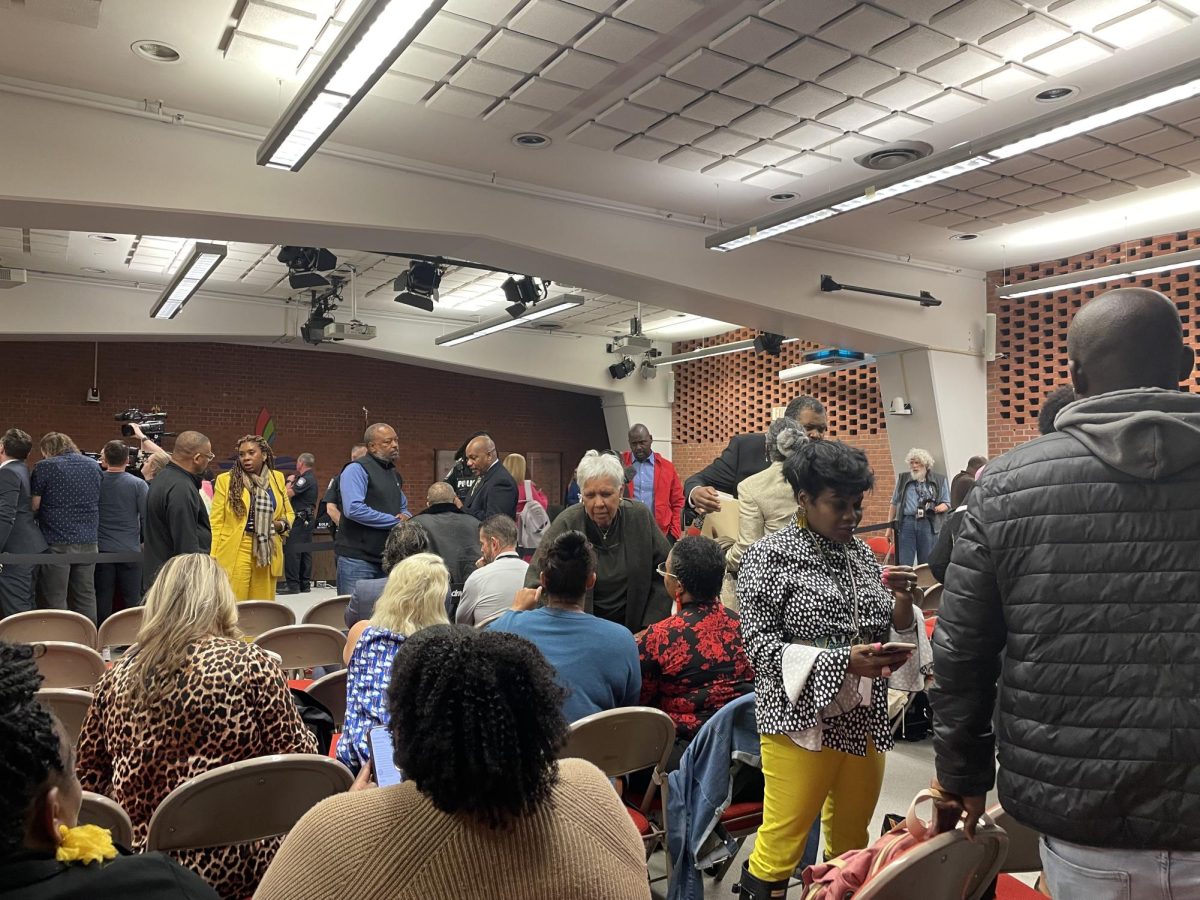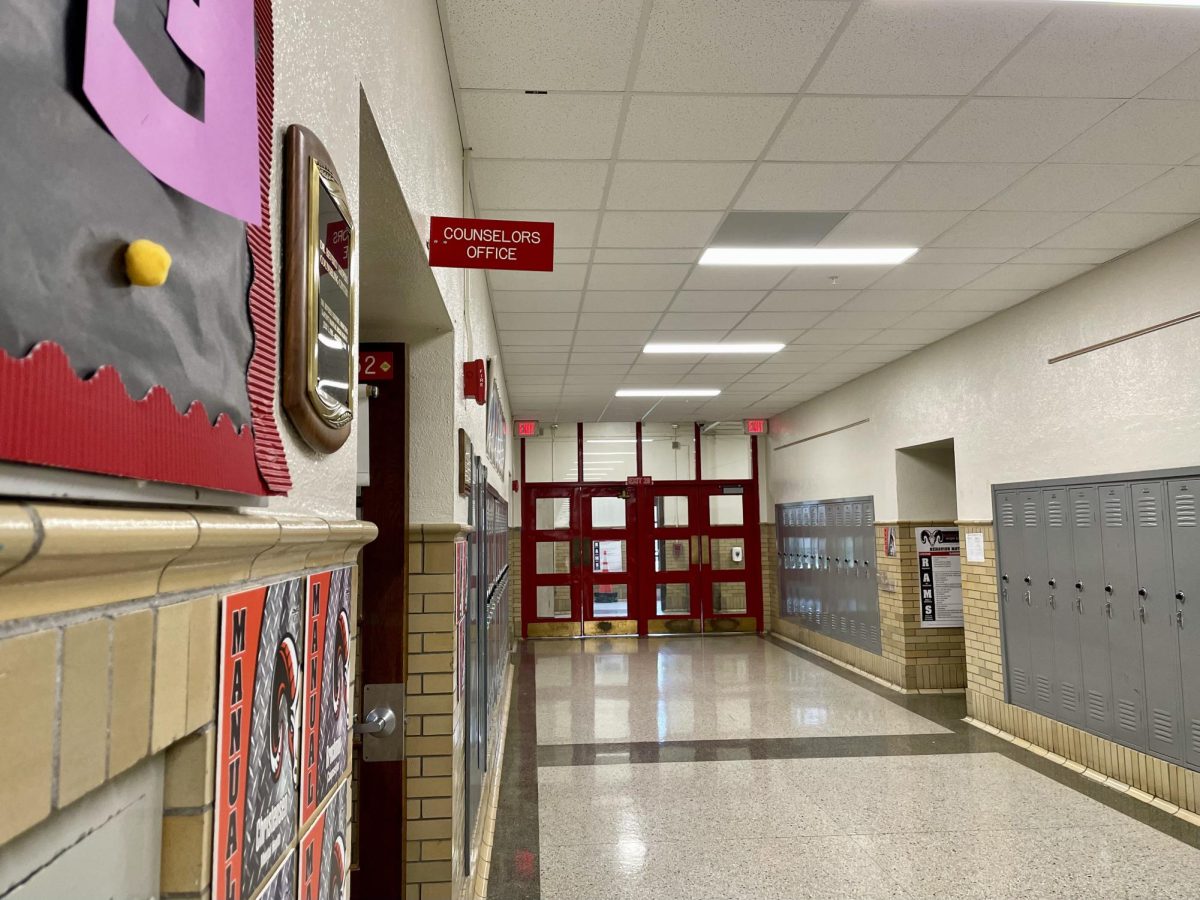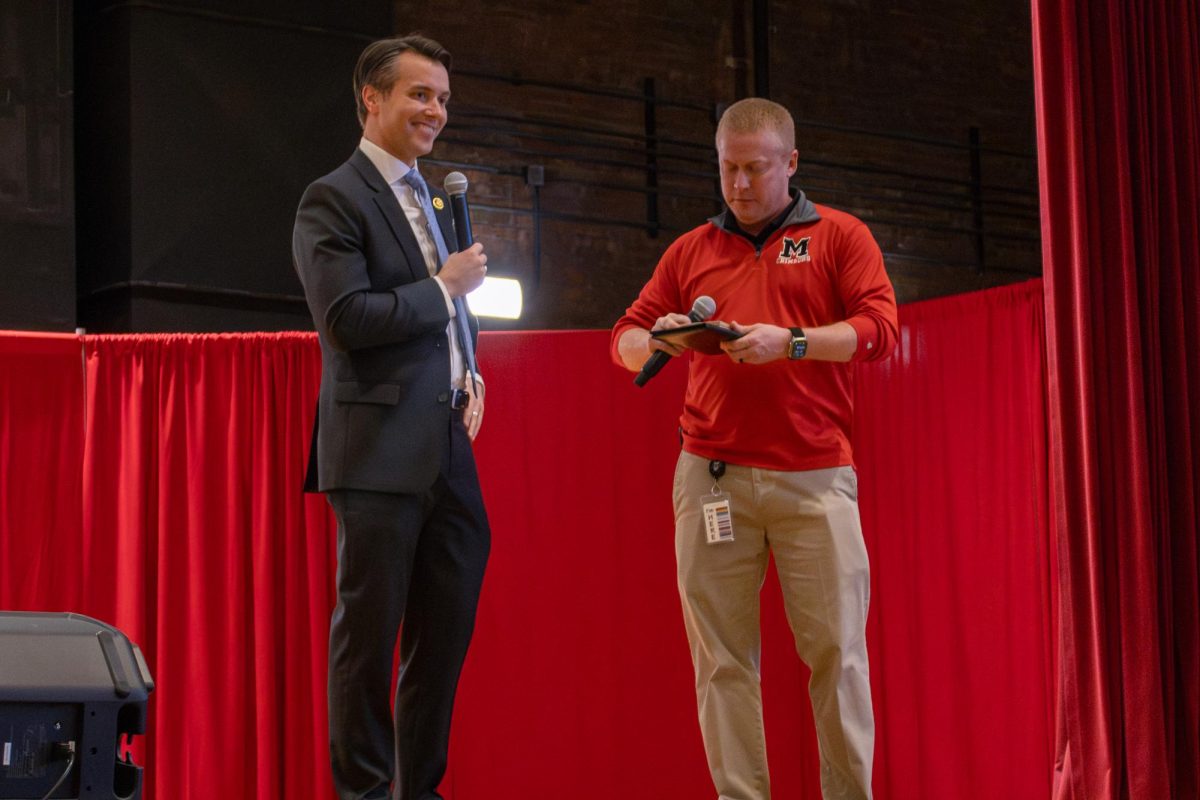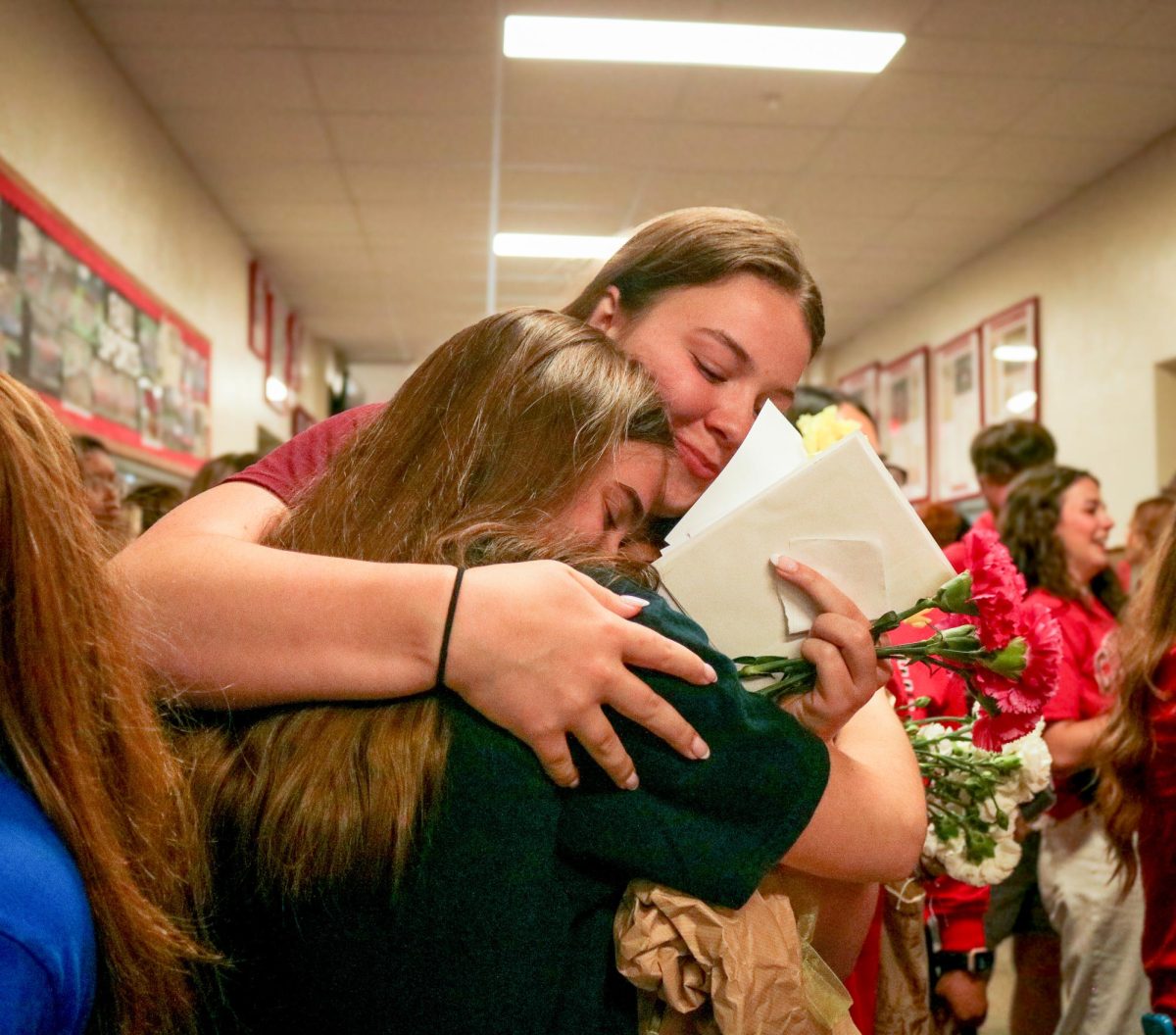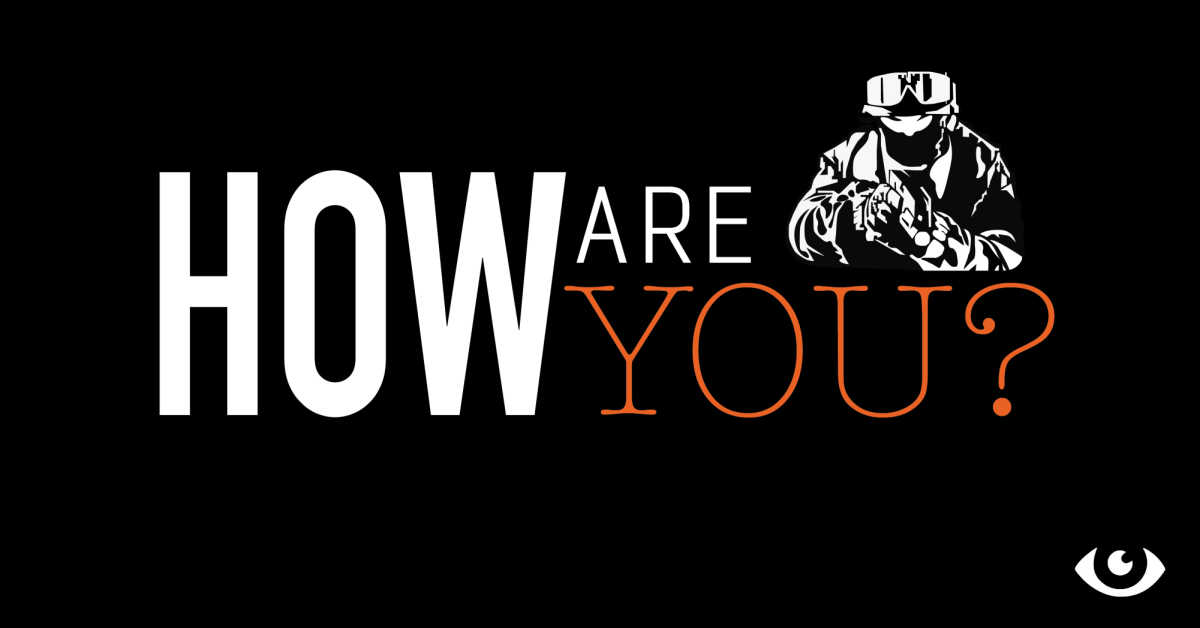On July 25, the Jefferson County Board of Education voted 5-1 to place $12 million worth of metal detectors in every JCPS middle and high school by the end of the 2023-2024 school year. JCPS purchased the weapon detectors from Evolv, an AI technology firm currently under investigation by the Federal Trade Commission (FTC) for false advertising. While the weapon detectors are intended to provide enhanced security in JCPS schools, many are worried about the effectiveness of the weapon detectors and the trustworthiness of Evolv, the company behind them.
On Evolv’s website, the company states its detectors utilize “advanced sensor technology” and artificial intelligence to “distinguish between weapons and everyday items.” Security watchdogs like the Internet Protocol Video Market (IPVM) have proven, however, that Evolv’s systems are often inaccurate and inconsistent. IPVM reported that in North Carolina’s Charlotte-Mecklenburg School System (CMS), where schools have already installed Evolv detectors, false alarms are so prevalent that students are instructed to unpack their bags of “anything with metal” and hold Chromebooks, water bottles and binders over their heads to avoid being flagged while passing through the detectors.
Jamie Brooks, principal of CMS’ Ardrey Kell High School, expressed frustration with Evolv’s scanners within days of their installation. She shared these sentiments in an internal email obtained by Manual RedEye in an open records request.
“Currently, the reality is that ‘weapons of mass instruction’ set off almost every child as they walk through,” said Brooks. “If you have multiple binders or spiral notebooks in your bag, then it lights up and we must search. The solve I was given was literally to ask kids not to bring so many binders. Seriously?”
Unreliable Detectors
During IPVM testing, Evolv’s weapon detectors demonstrated a false alarm rate of up to 60%, flagging umbrellas, binders, water bottles, lunch boxes, eyeglass cases and Chromebooks as guns or bombs. In fact, IPVM found that common school supplies were flagged by the system more consistently than actual weapons. Evolv’s proposed solution is for customers to increase staff presence and purchase supplemental technology like conveyor belts, so that students can “place known nuisance alarm items on conveyors before they pass through the system.”
Evolv has also failed to prevent instances of violence. In Utica, New York, a student was stabbed in 2022 after an assailant passed undetected through Thomas Proctor High School’s Evolv weapon detector with his seven-inch hunting knife. Utica’s school system has since removed Evolv technology from its schools, and the company now faces a lawsuit from the injured student claiming that the unreliability of its technology poses student safety concerns.
Shady Business Practices
Watchdog organizations have also exposed many unethical practices by Evolv while advertising their product. For example, Evolv has repeatedly opposed IPVM’s publication of the security risks of their detectors, claiming that sharing information about Evolv’s shortcomings “puts the general public at greater risk.”
“[It’s] impossible to fix every vulnerability,” Evolv said in a message to IPVM requesting they remove their reports on Evolv’s poor performance. “Because the general public may include potential threat actors, it is important to avoid disclosing information publicly that could help threat actors mount a successful attack.”
IPVM argues that Evolv merely wishes to keep the performance of its weapon detectors a secret, while monopolizing the flow of information about its detectors to maintain a positive public image and secure further sales. In an interview with Manual RedEye, IPVM Government Research Director Conor Healy explained why Evolv’s closed-off approach can be seen as untrustworthy.
“Even if Evolv privately discloses shortcomings to school districts, that doesn’t cut it. When you’re selling to government agencies, you can’t lie in public and tell the truth in private,” said Healy. “In a democracy, the public is entitled to truthful information on how millions are being spent. Moreover, when parents and students believe Evolv is more capable than it really is, they are less likely to pose important questions about how else funds might be used, such as on mental health resources.”
Evolv’s evaluation by the National Center for Spectator Sports Safety and Security (NCS4) showcases another example of the company obscuring the truth. IPVM reported that Evolv paid NCS4, a government entity, in exchange for letting Evolv set the evaluation criteria for its scanners’ product testing and allowing the company to edit the final report. This predictably led to the final report granting the detectors a score of 2.83 out of 3.00, which Evolv claimed was “validation of [their] technological and market lead.”
However, the financial relationship between NCS4 and Evolv was not publicly disclosed by either organization, and Evolv claimed that the NCS4 evaluation was completed by a “fully independent third party.” IPVM obtained early versions of the NCS4 evaluations, which uncovered that Evolv’s detectors featured only a 53% detection rate for all knives and that Evolv was unable to detect non-ferrous metals used for improvised explosives, such as lead pipe bombs. These results were removed from the final report by Evolv, who also changed testing criteria to grant points for basic functions like working LED lights, thereby artificially inflating its final score.
Evolv has also been reported to have engaged in questionable business practices while soliciting the business of the Jefferson County Board of Education. According to information uncovered by Louisville Public Media, Evolv requested to write JCPS’ request for proposal (RFP) for weapon detection systems, a practice illegal for state-level organizations. An RFP is a business document that publicly announces a solicitation for a product or service from contractors and details specific requirements that must be met by a contractor’s service to be accepted. According to Louisville Public Media, the Board of Education’s RFP mandated specifications that identically matched Evolv’s own product description, down to the placement of the lights on the machine. This effectively blocked other weapon detection companies from responding to JCPS’ request for a contract, because their products would not identically match what JCPS had described, despite being functionally the same and potentially cheaper to purchase. Aside from Linda Duncan, no JCPS Board members responded to interview requests concerning Evolv.
A False Sense of Security
In addition, Evolv’s business practices have recently fallen under FTC investigation to determine if Evolv engages in false advertising by misrepresenting the capabilities of its technology. Notable to this investigation is Evolv CEO Peter George’s outlandish claim to investors that Evolv is able to detect every weapon in the world.
“We’ve written the signatures for all the threats that are out there, all the guns that exist… all the guns, all the bombs, all the large tactical knives,” said George. “We’ve written the signatures for all those weapons and we can determine whether we see one of those signatures or not.”
Evolv originally marketed its detectors around their ability to create “weapons-free zones,” with George claiming that Evolv allows “people to gather and know that nobody has a weapon.” However, after the failure of Evolv technology to prevent the 2022 stabbing in Utica and the exposure of other Evolv shortcomings by IPVM, the company subsequently admitted that the claim of creating weapons-free zones “generalize[d] our capabilities,” switching its primary marketing claim to creating “safer spaces” instead.
Evolv has also claimed in their advertising that Evolv detectors allow people to “move quickly through security checkpoints at a seamless pace,” “requiring no stopping, no emptying of pockets or removing bags.” However, this has already been proven to be far from the truth in school systems like CMS, which have already experienced the hassles and delays of searching students due to false alarms.
“Evolv often recognizes everyday items as weapons, despite marketing that it can seamlessly tell the difference… The problem is that with each false positive, a student must be searched and Evolv’s high false positive rates can lead to burdensome requirements on school staff and students being late to class. The other problem is that schools are spending millions of dollars on devices that don’t perform as marketed, ” said IPVM’s Conor Healy.
Because of this failure to offer consistent results, some argue that the limitations of Evolv technology reduce its weapons detectors to ineffective security theatre, designed to provide artificial peace of mind without detecting weapons effectively.
“[Evolv scanners] work as a preventative tool as well as a prohibitive tool; students and staff know the scanners work,” said CMS Chief Operating Officer Brian Schultz in an internal email justifying the school system’s purchase. Schultz did not respond to RedEye’s request for comment.
“My hope is that this system will deter students from bringing weapons to school. This will not be perfect, but if [Evolv] deters people from bringing such weapons, lessening the odds that someone will be wounded by them, the system will have served its purpose,” said JCPS Board member Linda Duncan in a statement released to Manual RedEye.
However, the proof that Evolv scanners can actually work through detection, rather than deterrence, remains to be seen. In CMS, only one gun was detected on campuses during the 2022-23 school year after Evolv’s installation, compared to thirty guns detected by other means in the 2021-22 school year, before the scanners were installed. In fact, some have reasoned that the burden of manning the detectors and searching false alarms creates a larger safety issue by drawing limited manpower away from alternate entrances and high-density areas.
“Today was probably the least safe day at [CMS’ Ardrey Kell High School], as all hands were at the front doors instead of monitoring kids throughout the building,” said Principal Brooks in an internal email after Evolv detectors were installed at her school.
Even locally, students are reportedly finding ways to avoid Evolv detectors mere months into their installation.
“The more they’ve been used, the more ways people find to get around them,” said Avery Allen, a senior at Ballard High School, where Evolv detectors are in use. “I have seen students being let in other entrances by friends on the inside, which is a little scary.”
“A false sense of security is dangerous, and when Evolv misrepresents its capabilities, that is what it creates,” said IPVM’s Conor Healy. “Moreover, if many security and/or teaching staff are required to manage Evolv checkpoints, that means they are not supervising other parts of a school, which can also pose a risk.”
The Costs of Increased Surveillance
IPVM also cites ‘alarm fatigue’ as a security risk posed by Evolv. Based on screening data from Quarter 1 of 2022, IPVM calculated that Evolv’s ratio of false alarms to detected weapons is 310:1, noting in a report that this can cause security officers to take the detectors’ alerts less seriously.
“…Alarm fatigue is a factor that should be considered when installing Evolv Express. Alarm fatigue can negatively affect security personnel, decreasing both their attention and urgency when an alarm is flashed. This can lead to missed weapons,” reads the report.
Alarm fatigue has reportedly altered security procedures inside CMS, according to internal emails obtained in an open records request. In those emails, Cassie Fambro, CMS’ Media Relations Specialist, outlines ways in which corners are being cut only a year into using Evolv technology.
“While the detectors have been added, students say they have witnessed other students allowed to walk around them, so the detectors don’t do much,” said Fambro. “They also told me that if their bag does alert the metal detectors, someone will just quickly look at the top of their bag instead of going through the bag.”
However, Board member Linda Duncan maintains her belief that alarm fatigue will not pose a safety issue in JCPS. In her statement to Manual RedEye, Duncan argues that the high sensitivity of Evolv scanners will increase the likelihood of weapons being found, regardless of Evolv’s actual accuracy.
“I have walked through Evolv weapon detection systems at various venues, including Kentucky Kingdom. Twice I was flagged for a bag search at Kentucky Kingdom because I was carrying a metal can of sunscreen,” said Duncan. “I feel confident that the 207 handguns, BB guns, tasers, pellet guns and stun guns we collected last year would have been revealed by this system.”
Research has shown that students and staff exhibit heightened levels of fear in schools with visible security measures like those being installed in JCPS. A 2018 study found that for students, measures like security scanners “may evoke feelings of being viewed as potential perpetrators who need surveillance,” especially in already-marginalized groups. This climate can inhibit learning, pose a distraction, and draw disapproval from students.
“I would say the detectors have given a lot of students a negative attitude and resentment towards school administration, even though it’s not their fault,” said Ballard senior Avery Allen.
This evidence composes JCPS board member Chris Kolb’s opposition to installing weapon detectors in schools. On July 25, Kolb cast the sole vote against purchasing technology from Evolv.
“If we approve weapons detectors, here is what research, evidence, and hard data tells us we will be doing: we will be seriously harming the educational environment, scaring children for no safety benefit, oppressing Black and Queer children, and likely increasing the amount of violence, crime, disruption and disorder in schools,” said Kolb at the July 25 board meeting. “Weapon detectors and racism go hand in hand.”
JCPS is completely justified in wanting to ensure its schools are safer spaces. After seven gun-related incidents in JCPS schools only halfway through the academic year, its desires to improve safety have proven more relevant than ever before. However, while the deal with Evolv shows that JCPS’ heart is in the right place, it is clear that these detectors are far from the silver bullet that many hoped they would be. With JCPS’ pockets $12 million lighter after the Evolv deal, the district must continue its search for safety solutions.
“Every dollar we spend on things that don’t work is a dollar we can’t spend on things that do work,” said Kolb. “When these devices fail to detect guns and knives… it won’t just be the flawed Evolv devices we’ll end up paying for.”



